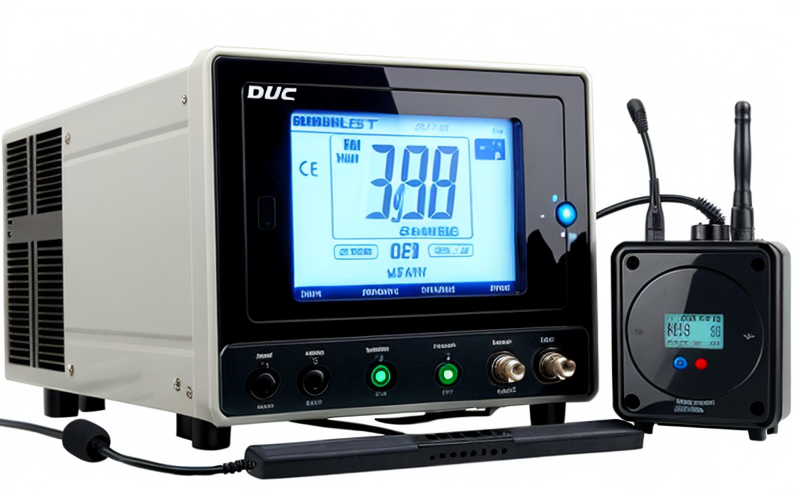3GPP TS 38 104 5G NR Base Station RF Testing
The TS 38.104 of the 3GPP defines the New Radio (NR) for Fifth Generation (5G) mobile communication standards, focusing on the Base Station (gNodeB). This service centers around ensuring that gNodeBs meet stringent radio frequency (RF) performance requirements as outlined in this specification. Proper RF testing is critical to ensuring interoperability and compliance with 3GPP standards.
The RF testing for 5G NR base stations involves a range of measurements including but not limited to:
- Downlink (DL) and Uplink (UL) power levels
- Polarization characteristics
- Channel state information (CSI)
- Interference margins
- Spectral efficiency
To meet these requirements, we use advanced RF test equipment such as spectrum analyzers, vector network analysers (VNAs), and signal generators. The testing process typically involves setting up the gNodeB in a controlled environment to simulate real-world conditions where it will operate. This setup allows us to measure its performance against the stringent criteria set forth by 3GPP.
Our service ensures that all tests are conducted according to international standards, including ISO/IEC and IEEE standards relevant to RF testing. By adhering strictly to these guidelines, we ensure that our clients receive accurate test results that can be relied upon for regulatory compliance or internal quality assurance.
| Test Parameters | Description |
|---|---|
| Downlink Power Output | Ensures the base station transmits at optimal power levels without causing interference to other networks. |
| Uplink Received Signal Strength Indicator (RSSI) | Measures the strength of signals received from user equipment, ensuring efficient network operation. |
| Polarization Angle | Determines whether the polarization is vertical or horizontal, important for aligning antennas correctly in installations. |
| Intermodulation Distortion (IMD) | Evaluates how well the base station handles multiple signals simultaneously without distortion. |
In summary, our 3GPP TS 38.104 RF testing service provides a comprehensive approach to ensuring that 5G NR base stations meet all necessary performance criteria. This process not only guarantees compliance with international standards but also enhances the reliability and efficiency of wireless networks.
Benefits
Conducting thorough RF tests on 5G NR base stations brings numerous benefits to our clients:
- Achieve regulatory compliance: Ensures that all equipment meets the stringent requirements set by global standards bodies like 3GPP.
- Enhance network performance: Identifies and rectifies issues early in the development process, leading to more efficient networks.
- Promote interoperability: Ensures seamless communication between different vendors’ equipment within a single network.
- Reduce deployment costs: By identifying and fixing problems during testing rather than after installation, clients can save on potential rework or replacement expenses.
- Improve user experience: Optimized base stations lead to better coverage areas, faster data rates, and reduced latency.
- Foster innovation: Reliable RF testing allows for the development of cutting-edge 5G technologies, driving industry progress.
In addition to these direct benefits, our service also supports broader strategic objectives such as enhancing brand reputation through proven reliability and fostering long-term relationships with clients. By leveraging this expertise, we help our clients stay ahead in an increasingly competitive market.
Competitive Advantage and Market Impact
Our 3GPP TS 38.104 RF testing service provides a significant edge in the market by:
- Offering deep expertise: Our team consists of highly skilled engineers with extensive experience in wireless communication technologies.
- Utilizing advanced equipment: We leverage state-of-the-art test instruments that provide precise and reliable measurements.
- Prioritizing customer satisfaction: We ensure every client receives personalized attention, tailored solutions, and timely delivery of results.
- Adhering to international standards: By strictly following ISO/IEC and IEEE guidelines, our tests are recognized globally, enhancing credibility.
- Supporting rapid prototyping: Our service enables clients to quickly identify and address issues in their prototypes, accelerating the product development cycle.
- Fostering collaboration: We work closely with clients throughout the testing process, offering insights that can inform future design decisions.
These advantages contribute to a stronger market position for our clients, enabling them to deliver high-quality products and services more effectively. In an era where 5G technology is rapidly evolving, being able to offer such comprehensive RF testing is crucial for maintaining competitiveness.
Use Cases and Application Examples
The application of 3GPP TS 38.104 RF testing spans various industries and use cases:
- Telecommunication Providers: Ensuring network reliability, coverage, and interoperability.
- Manufacturers of Base Stations: Validating product performance before market release.
- Research Institutions: Supporting the development of new 5G technologies and standards.
- Telecommunications Equipment Vendors: Providing detailed test reports for regulatory compliance.
- Consulting Firms: Offering expert advice on network optimization and performance enhancement.
- Government Agencies: Ensuring public safety through robust communication networks.
In each case, the goal is to ensure that 5G NR base stations perform optimally in real-world scenarios. This includes testing under various environmental conditions such as urban, suburban, and rural settings, ensuring consistent performance across diverse environments.
| Use Case | Description |
|---|---|
| Telecommunication Providers | Ensuring network reliability and coverage. |
| Manufacturers of Base Stations | Validating product performance before market release. |
| Research Institutions | Supporting the development of new 5G technologies and standards. |
| Telecommunications Equipment Vendors | Providing detailed test reports for regulatory compliance. |
| Consulting Firms | Offering expert advice on network optimization and performance enhancement. |
| Government Agencies | Ensuring public safety through robust communication networks. |
The results of these tests are crucial for the successful implementation of 5G technology, contributing to enhanced connectivity and improved user experiences globally.





